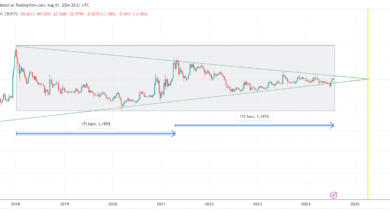DeFAI: Revolutionizing Crypto with AI Bots

In the ever-evolving landscape of cryptocurrency, a new player has emerged that promises to revolutionize the way traders interact with digital assets: DeFAI. This innovative fusion of Decentralized Finance (DeFi) and Artificial Intelligence (AI) is poised to transform the crypto market by introducing AI bots that streamline complex tasks for users. Notable contenders like Griffain and Hey Anon are leading the charge, showcasing the potential of DeFAI to handle everything from transaction execution to portfolio management. With the ability to automate processes and execute commands with ease, the DeFAI ecosystem is designed to enhance user experience and efficiency in a space that often seems overwhelming. As the integration of AI within decentralized finance gains traction, DeFAI could become the key to unlocking the full potential of cryptocurrency trading for both seasoned investors and newcomers alike.
The concept of DeFAI, a blend of digital currency and artificial intelligence, highlights a significant shift in the crypto sector. This new breed of AI-powered bots is set to enhance the user experience by streamlining processes typically associated with decentralized finance platforms. Projects such as Griffain, which leads the industry, exemplify how AI technology can automate complex tasks, making crypto trading more accessible. Furthermore, initiatives like Hey Anon are paving the way for a new interaction model within the blockchain ecosystem. Through the integration of AI advancements into DeFi operations, we are witnessing the dawn of a new era that simplifies the often convoluted interactions users face in the world of cryptocurrencies.
Understanding DeFAI: The Fusion of AI and DeFi
DeFAI, short for Decentralized Finance Artificial Intelligence, represents a groundbreaking convergence of two innovative sectors: AI technology and decentralized finance. This integration aims to enhance user experiences in the crypto space by automating complex transactions and decision-making processes. By leveraging AI bots, such as those developed by companies like Griffain and Hey Anon, DeFAI enables users to manage their crypto portfolios efficiently without needing deep technical expertise. These AI tools are designed to execute commands based on user preferences, streamlining processes that previously required manual intervention.
Moreover, the potential of DeFAI technology lies in its ability to analyze vast amounts of data in real time, providing actionable insights and strategic recommendations to users. This significantly reduces the friction associated with traditional DeFi activities, positioning DeFAI as a key driver of adoption and innovation within the crypto ecosystem. Users can easily instruct bots to engage in trades, monitor gas fees, and optimize transaction timing, making decentralized finance more accessible to a broader audience.
Griffain: Leading the Way in DeFAI
Griffain stands out as the frontrunner in the DeFAI arena, having amassed a market capitalization exceeding 550 million US dollars. This burgeoning project, which receives backing from prominent institutions like Solana Labs, showcases the potential of AI in automating complex financial operations. Users can instruct Griffain’s AI bots to engage in various activities, from conducting market analyses to launching new memecoins and minting NFTs. This capability allows individuals to optimize their engagement with crypto markets without the steep learning curve that usually accompanies such tasks.
The innovative features of Griffain position it as a vital player in the DeFi landscape. By providing users with the tools necessary to implement tailored crypto strategies, Griffain empowers individuals to execute financial maneuvers that would otherwise require extensive research and understanding of the decentralized ecosystem. However, it’s essential to note that currently, the services are available through an early-access version, emphasizing exclusivity while still generating excitement and curiosity among potential users.
AIWayfinder: The Promising Future of DeFAI
AIWayfinder, another promising initiative within the DeFAI landscape, is designed to revolutionize how users interact with blockchain technologies. While still in the investment speculation phase, the upcoming native token PROMPT is anticipated to catalyze a unique ecosystem dynamic where developers enhance their offerings in exchange for user engagement. The proposed model operates similarly to a licensing fee system, providing an incentive for developers to create innovative solutions that users can benefit from, thereby driving activity and value generation on the platform.
As the AIWayfinder platform prepares for its Token Generation Event, the implications of its model highlight the importance of community involvement in ecosystem growth. By allowing developers to stake their tokens for publishing routes and earning revenues based on user adoption, AIWayfinder creates a self-perpetuating cycle of innovation. The anticipated launch of PROMPT could mark a significant milestone in the DeFI space, positioning AIWayfinder alongside frontrunners like Griffain and Hey Anon as a catalyst for broader AI integration within decentralized finance.
Hey Anon: A Trailblazer in DeFAI Integration
Founded by Daniele Sesta, the Hey Anon project embodies the DeFAI revolution, providing an all-in-one platform for crypto enthusiasts seeking tools that simplify DeFi interactions. With functionalities that allow users to bridge assets, stake funds, and access live price data in conjunction with community-driven resources like Gemma, Hey Anon is crafted for the modern crypto user. The rapid rise in the value of the ANON token emphasizes the strong interest in integrated DeFi solutions that seamlessly blend accessibility with operational transparency.
The vision of Hey Anon that incorporates AI elements into a user-friendly interface resonates with the broader aspirations of the DeFi community. By aggregating information from various social media and data platforms, Hey Anon serves not only as a technical tool but also as a research assistant for users, helping them make informed investment decisions. As the public beta release draws closer, the potential impact of Hey Anon’s offerings could lead to significant shifts in how individuals navigate the crypto landscape, potentially onboarding a new generation of DeFi enthusiasts.
Orbit and Neur: Emerging Contenders in DeFAI
Following the lead of Griffain, projects like Orbit and Neur are vying for their share of the growing DeFAI ecosystem. Orbit distinguishes itself with its emphasis on cross-blockchain functionality, integrating support for over 117 blockchains and 200 protocols, addressing the scalability and interoperability pain points prevalent in DeFi. With a market cap of over 120 million US dollars, Orbit’s innovative approach positions it as an essential player in the DeFI landscape, enabling users to manage diverse crypto portfolios seamlessly across different networks.
Meanwhile, Neur has positioned itself as a virtual co-pilot specifically for users within the Solana ecosystem, with functionalities that cater to rapid trading and portfolio management. Users can effortlessly copy trades of successful crypto Key Opinion Leaders (KOL), allowing for quick adoption of emerging trends. This model not only streamlines the trading process for novice users but also promotes community engagement and strategy sharing, reflecting the collaborative spirit vital to the growth of the DeFi sector. Both Orbit and Neur highlight the increasing demand for user-friendly solutions as DeFi continues to gain traction in the crypto market.
The Rise of AI Bots in the Crypto Market
The rapid evolution of AI bots like aigbt, Griffain, and Hey Anon marks a transformative shift within the crypto market, reflecting the growing need for efficiency and automation. These bots are engineered to assist users in managing their crypto endeavors, from executing complex financial transactions to providing insightful market analysis. By leveraging advanced algorithms, these bots can operate at speeds and accuracies that far exceed manual processes, removing barriers that have previously deterred widespread crypto adoption.
Additionally, the incorporation of AI-driven solutions into the crypto space addresses user pain points associated with decentralized finance, such as the steep learning curve and the overwhelming array of decentralized applications. As these intelligent bots become increasingly prevalent, they promise not only to enhance individual trading experiences but also to contribute to a more streamlined and accessible ecosystem for all participants. The future of crypto could be dominated by these AI integrations, establishing a new norm in digital finance.
The Future of DeFi with AI Integration
As the DeFi space continues to evolve, the integration of AI technology holds the potential to reshape the user experience entirely. Enhanced by AI’s capabilities, the next generation of DeFi tools will offer unprecedented levels of customization and automation, helping users navigate through the often convoluted processes of decentralized finance. By utilizing intelligent AI bots, users can simply articulate their desired outcomes and let the technology manage the intricate details behind the scenes, fostering a more casual and accessible approach to managing investments.
The proliferation of DeFAI technologies hints at a renaissance in how decentralized finance operates, potentially leading to increased liquidity and decreased fragmentation among the myriad of blockchain networks. As developers continue to innovate and refine their AI solutions, the emphasis will be on delivering real value to users, creating an ecosystem that not only appeals to seasoned investors but also attracts newcomers eager to explore the world of decentralized finance.
Challenges and Opportunities in DeFAI
Despite the promising developments surrounding DeFAI, several challenges lie ahead. Many projects are still in their infancy, requiring significant refinement before achieving widespread adoption. Developers must focus on ensuring that their AI integrations deliver genuine utility to users; otherwise, there is a risk that the technologies may fail to resonate with their intended audience. Additionally, the volatile nature of the crypto market poses ongoing challenges, necessitating strategies that account for rapid fluctuations and changing regulatory landscapes.
Conversely, the obstacles faced by DeFAI projects present opportunities for innovation and growth. As the demand for efficient and user-friendly solutions increases within the crypto community, teams that can effectively distinguish themselves through unique offerings will stand to benefit immensely. The competition among AI-based projects ultimately drives refinement and improvement, paving the way for a robust DeFi landscape that meets the needs of modern crypto users.
Final Thoughts on DeFAI and Its Market Impact
As DeFAI continues to evolve, its impact on the broader crypto market will undoubtedly become more pronounced. The integration of AI technologies stands to redefine the ways in which users engage with decentralized finance, from automating mundane tasks to providing sophisticated analyses that inform investment strategies. DeFAI projects like Griffain, Hey Anon, and AIWayfinder represent the vanguard of this transformation, demonstrating the significant potential inherent in blending AI with DeFi principles.
Ultimately, the future of DeFAI is closely linked to user adoption and satisfaction. As the crypto market progressively matures and the value propositions of AI bots become clear, there’s potential for DeFAI to capture the imagination of both new and seasoned investors. Should these tools prove effective in alleviating existing pain points within the DeFi ecosystem, we can anticipate a substantial influx of liquidity and engagement, driving growth and innovation in the sector for years to come.
Frequently Asked Questions
What is DeFAI and how does it relate to crypto AI bots?
DeFAI is a groundbreaking fusion of Decentralized Finance (DeFi) and Artificial Intelligence (AI), aimed at streamlining crypto transactions through the use of crypto AI bots. Projects like Griffain and Hey Anon leverage DeFAI to offer users automated solutions for managing crypto activities, reducing the complexity of navigating decentralized applications (dApps). This innovation allows users to execute commands like exchanging tokens or bridging assets with minimal manual input, enhancing the overall user experience in the crypto space.
How are Griffain and AIWayfinder leading the DeFAI sector?
Griffain is recognized as a leader in the DeFAI sector, boasting a market capitalization of over 550 million USD. It allows users to automate diverse crypto tasks, from conducting market research to launching Memecoins. Similarly, AIWayfinder stands out for its unique features set to enhance interactions within the blockchain ecosystem. Both platforms highlight the potential of DeFAI to simplify user experiences in the complex world of crypto.
What tasks can crypto AI bots like Hey Anon perform for users?
Crypto AI bots like Hey Anon are designed to automate various tasks in the crypto space, including bridging assets, staking, and conducting market analyses. Users can send instructions to these bots to execute trades or manage their portfolios based on pre-defined criteria, eliminating the need for users to engage with complex Web3 interfaces directly.
When is the Token Generation Event for AIWayfinder’s PROMPT token expected?
The Token Generation Event (TGE) for AIWayfinder’s PROMPT token is anticipated to occur by the end of the third quarter of 2025. This token will incentivize users while fostering efficiency in blockchain activity management, aiming to create a positive feedback loop between developers and users in the DeFAI ecosystem.
What makes DeFAI different from traditional DeFi solutions?
DeFAI differentiates itself from traditional DeFi solutions by integrating advanced AI capabilities, allowing for automated transaction management and personalized services. This innovative approach reduces user friction in executing complex DeFi activities, providing a seamless experience that traditional systems may struggle to achieve.
How can DeFAI potentially transform the crypto market?
DeFAI has the potential to revolutionize the crypto market by simplifying the user experience and addressing significant pain points associated with decentralized finance. By using AI bots to facilitate tasks like trading and portfolio management, it could drive greater adoption of DeFi solutions, much like how search engines transformed internet usage.
Are there risks associated with using DeFAI platforms like Griffain and Hey Anon?
While DeFAI platforms like Griffain and Hey Anon offer advanced features for automating crypto activities, users should be aware of inherent risks, including market volatility and potential bugs in AI algorithms. Additionally, as these platforms are still new, their long-term reliability and security are yet to be fully established.
What role does the ANON token play in the Hey Anon ecosystem?
The ANON token serves as a crucial component within the Hey Anon ecosystem, enabling functionalities such as staking, securing transactions, and potentially providing governance rights. Its surge in value reflects the growing interest in DeFAI solutions, underscoring the token’s importance as a tool for accessing the platform’s services.
How does DeFAI improve user experience in a fragmented crypto landscape?
DeFAI enhances the user experience in a fragmented crypto landscape by automating complex processes and transactions across different blockchains. This integration can help mitigate liquidity issues and simplify user interactions, making it easier for newcomers to navigate the complexities of crypto and DeFi.
What future developments can we expect from DeFAI initiatives?
Future developments in DeFAI initiatives may include improved AI algorithms for better decision-making, expanded functionalities across more dApps, and the potential creation of additional native tokens to enhance ecosystem participation. As these projects mature, they may lead to a more cohesive and user-friendly DeFi landscape.
| Key Point | Details |
|---|---|
| Introduction of DeFAI | DeFAI merges DeFi and AI technologies, aiming to enhance user experiences in cryptocurrency transactions. |
| Role of AI Bots | AI bots like Griffain and Hey Anon are set to automate various crypto activities for users, simplifying the trading process. |
| Griffain’s Leadership | Griffain leads the sector with over $550 million market cap, offering functionalities like market analysis and NFT minting. |
| AIWayfinder’s Vision | AIWayfinder, though not yet launched, promises a token that incentivizes developers and promotes efficient blockchain activities. |
| Hey Anon Innovations | Founded by Daniele Sesta, Hey Anon integrates DeFi features with a focus on research and market analysis. |
| The Position of Orbit and Neur | Orbit, with its cross-blockchain capabilities, and Neur, as a portfolio management tool, exemplify emerging AI solutions. |
| Future Prospects of DeFAI | Despite current limitations, successful AI bots could significantly improve user adoption and liquidity in DeFi. |
Summary
DeFAI symbolizes a transformative shift in the cryptocurrency landscape by integrating Artificial Intelligence with Decentralized Finance. As AI bots like Griffain and Hey Anon streamline complex crypto processes, users can expect improved efficiency and ease of interaction in the DeFi space. With the potential to address significant user experience challenges, DeFAI could herald a new era for digital finance, paving the way for broader acceptance and integration of cryptocurrencies.



